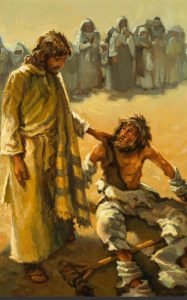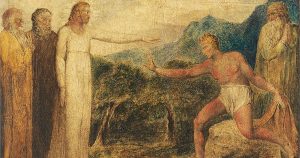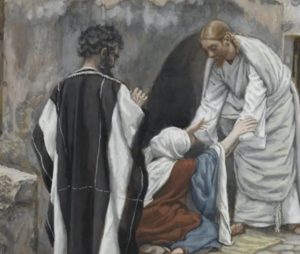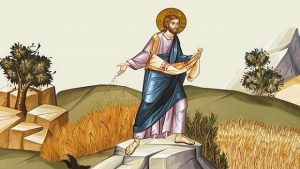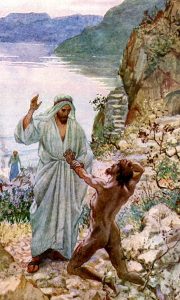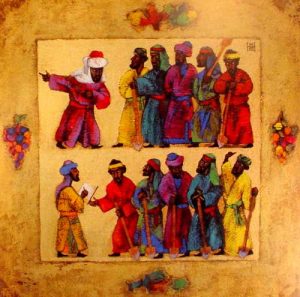Today, we enter a new liturgical season, the first Sunday of Lent. We are called to give much time to our daily meditation, sacrifices, and fasting for the remission of sins. We must do some kind of penance for personal, communal and our constant omission of the practice of Christian values. We are called to focus on the spiritual redirection of our lives towards God.
Last Sunday, some of us were unable to fulfill our Sunday obligation because of the snowstorm. There were 10 to 12 inches of snow on the ground, and most of the roads were hardly passable for the commuters. Drivers experienced the difficulty to see their own direction because of heavy snow. This is an image of our own burden and the sins we carry for so long that we lose track of our own direction. We don’t realize to stop, look, and listen to signs and warnings available to us to know where we are in our relationship with God and others.
Today is an opportunity to heed and listen to the Words of God to journey around here on earth with confidence and determination to reach our destiny to eternal life with God.
The 1st reading from the book of Genesis reminds us of how God created heaven and earth, and God saw that it was good. However, humanity failed to be faithful to God and rebelled against Him because of selfishness and disrespect. There was excessive flooding where humanity suffered because of disobedience. And after the great flood, God said to Noah and to his sons with
him, “See, I am now establishing my covenant with you and your descendants after you…….so that the waters shall never again become a flood to destroy all mortal beings.” God promised a “bow in the sky,” meaning a rainbow, as a reminder of the promise that He would continue redemptive creation through God’s everlasting love and mercy.
The 2nd reading from the first letter of Peter is a reminder about the prefiguration of the waters of Baptism to cleanse us. (v.21) Peter mentioned in his letter that Noah was saved from waters of destruction by being in the ark, and those who have been baptized in the floodwater, which means the waters of Jesus Christ, are certainly saved by being in the Ark of Christ.
The gospel of St. Mark 1:12-15 narrates to us the new beginning on the part of our Lord Jesus Christ’s public appearance. What lessons could we get from this gospel pericope as we journey through Lent?
First, the evangelist Mark tells us, “The Spirit drove Jesus out into the desert.” Though Satan tried to temp Him, he was not successful in deceiving Jesus for He is the new breed of humanity faithful to listen to the voice of God. Being driven by the Spirit, who was guiding Jesus into this experience of temptation. Jesus came out victorious by the fact that He was prepared by the Spirit to encounter and to face temptations, the enemy of God. Jesus never succumbs to temptations even during the most vulnerable moment before His passion when Satan seduced Him to abandon His mission; however, Jesus placed Himself in His Father’s hands, completely keeping His Father’s will.
Second, the gospel of Mark states that “Jesus came to Galilee proclaiming the gospel of God,” to His fellow Galileans making His first public appearance calling them to, “Repent and Believe in the gospel,” because He was committed to bring about the coming of God’s kingdom. It had been His primary focus to preach the Goodnews of salvation.
Third, Jesus earnestly proclaims, “This is the time of fulfillment. The kingdom of God is at hand.” Jesus prepares everyone to be faithful to God’s covenant by observing the path of holiness He preached.
We must be pleasing to God by believing in the Good News and taking to heart seriously, through our actions, all the teachings of our Lord Jesus Christ. Just as Jesus, the Son of God, had been pleasing to the Father Almighty, we cannot displease God Himself.
Today, in this first Sunday of Lent, we have found ourselves having our own experience of desolation and darkness of our souls, maybe in the form of doubts, fear, sickness and death, and all kinds of difficulties in life; however, we are given hope and profound encouragement not to succumb to all these wild beasts of pain and struggles that create brokenness. Instead, we must be firm and constant in faith so that staying close to God, the Spirit will always lead us to the right decision and the right path.
Be ever faithful to God who loves us, I pray that God would manifest His love so that I can keep Him in my heart and for me to overcome and let go of all the things that hinder me to become closer to the Lord.
St. Augustine has these words to reflect on during his First Sunday sermon. He said that days of Lent are not only to be spent but to remember that it is mystically signified. What we have deprived ourselves by fasting, like committing sins of adultery, fornication, and any other forms of unlawful immorality and corruptions, be solicitous and generous to the alms you give and dedicate yourselves to purity of prayer. Let us practice new patterns and Christian ways and indulge in the serious business of making ourselves significantly attend to the call of conversion, enough to begin realizing again our identity as His disciples. Let us always seek Jesus and listen attentively to Him, not Satan.
God bless you.
Fr. Arlon, osa
——————————
El Dictado del Corazón
Primer Domingo de Cuaresma, Año B
- Génesis 9:8-15
- Salmo 25:4-5, 6-7, 8-9
- 1 Pedro 3:18-22
Marcos 1:12-15
Hoy entramos en un nuevo tiempo litúrgico, el Primer Domingo de Cuaresma. Estamos llamados a dedicar el más tiempo posible a la oración y meditación diaria, a los sacrificios y al ayuno para la remisión de los pecados. Es necesario hacer penitencia por la omisión personal, comunitaria y practicar los valores cristianos. Estamos llamados a centrarnos en la redirección espiritual de nuestras vidas hacia Dios.
El Domingo pasado algunos de nosotros no pudimos cumplir con nuestra obligación dominical, debido a la tormenta de nieve. Había entre 10 y 12 pulgadas de nieve en el suelo y la mayoría de las carreteras eran difícilmente transitables para las personas mayores. Los conductores tuvieron dificultades para ver la dirección debido a las fuertes nevadas. Esta es una imagen de nuestra carga y de los pecados que cargamos durante tanto tiempo que perdemos el rumbo. No nos damos cuenta de que debemos detenernos, mirar y escuchar las señales y advertencias disponibles para saber dónde estamos en nuestra relación con Dios y los demás.
Hoy es una oportunidad para atender y escuchar la Palabra de Dios para caminar por aquí en la tierra con confianza y determinación para alcanzar nuestro destino de vida eterna con Dios.
La primera lectura del libro del Génesis nos recuerda cómo Dios creó el cielo y la tierra, y vio que era bueno. Sin embargo, la humanidad no pudo ser fiel a Dios y se rebeló contra Él por egoísmo y falta de respeto. Hubo inundaciones excesivas donde la humanidad sufrió a causa de la desobediencia. Y después del gran diluvio, Dios dijo a Noé y a sus hijos: “Mira, ahora estoy estableciendo mi pacto contigo y tu descendencia después de ti… para que las aguas nunca más se conviertan en un diluvio para destruir a todos los seres mortales”. Dios prometió un “arco en el cielo”, es decir, un arco iris, como recordatorio de la promesa de que continuaría la creación redentora mediante el amor y la misericordia eternos de Dios.
La segunda lectura de la primera carta de Pedro nos recuerda la prefiguración de las aguas del bautismo para limpiarnos. (v.21) Pedro mencionó en su carta que Noé fue salvo de las aguas de destrucción al estar en el Arca, y aquellos que han sido bautizados en el agua del diluvio, que significa las aguas de Jesucristo, ciertamente están a salvo mientras en el Arca. de Cristo.
El evangelio de San Marcos 1:12-15 nos narra el nuevo comienzo por parte de la aparición pública de nuestro Señor Jesucristo. ¿Qué lecciones podríamos obtener de este pasaje del evangelio a medida que avanzamos en la Cuaresma?
Primero, el evangelista Marcos nos dice: “El Espíritu empujó a Jesús al desierto”. Aunque Satanás intentó tentarlo, no logró engañar a Jesús porque Él es la nueva generación de humanidad fiel a escuchar la voz de Dios. Siendo impulsado por el Espíritu, quien estaba guiando a Jesús a esta experiencia de tentación. Jesús salió victorioso por el hecho de que fue preparado por el Espíritu para encontrar y enfrentar las tentaciones del enemigo de Dios. Jesús nunca sucumbe a las tentaciones, ni siquiera durante el momento más vulnerable antes de su pasión, cuando Satanás lo sedujo a abandonar su misión; sin embargo, Jesús se puso en manos de Su Padre, cumpliendo completamente la voluntad de Su Padre.
En segundo lugar, el evangelio de Marcos declara que “Jesús vino a Galilea proclamando el evangelio de Dios”, a sus compañeros galileos haciendo su primera aparición pública llamándolos a “arrepentirse y creer en el evangelio”, porque estaba comprometido a lograr la venida del reino de Dios. Su objetivo principal había sido predicar la Buena Nueva de salvación.
En tercer lugar, Jesús proclama fervientemente: “Este es el tiempo del cumplimiento. El reino de Dios está cerca”. Jesús prepara a todos para ser fieles a la alianza de Dios observando el camino de santidad que predicó.
Debemos agradar a Dios creyendo en la Buena Nueva y tomando en serio, a través de nuestras acciones, todas las enseñanzas de nuestro Señor Jesucristo. Así como Jesús, el Hijo de Dios, había agradado al Padre Todopoderoso, nosotros no podemos desagradar a Dios mismo.
Hoy, en este primer domingo de Cuaresma, nos hemos encontrado teniendo nuestra propia experiencia de desolación y oscuridad de nuestras almas, tal vez en forma de dudas, miedo, enfermedad y muerte, y todo tipo de dificultades en la vida; sin embargo, se nos da esperanza y un profundo aliento para no sucumbir a todas estas bestias salvajes de dolor y luchas que crean quebrantamiento. Al contrario, debemos ser firmes y constantes en la fe para que estando cerca de Dios, el Espíritu siempre nos lleve a la decisión correcta y al camino correcto.
Sean siempre fieles a Dios que nos ama, oremos para que Dios manifieste su amor para que pueda tenerlo en mi corazón y superar y dejar ir todas las cosas que me impiden acercarme más al Señor.
San Agustín tiene estas palabras para reflexionar durante su sermón del Primer Domingo. Dijo que los días de Cuaresma no son sólo para pasarlos sino para recordar que tiene un significado místico. Aquello de lo que nos hemos privado por el ayuno, como cometer pecados de adulterio, fornicación y cualesquiera otras formas de inmoralidad ilícita y corruptiva, ser solícitos y generosos con las limosnas que den y dedicarse a la pureza de la oración. Practiquemos nuevos patrones y maneras cristianas y entreguemos la seria tarea de hacernos atender significativamente al llamado de la conversión, lo suficiente para comenzar a realizar nuevamente nuestra identidad como Sus discípulos. Busquemos siempre a Jesús y escuchémosle atentamente a Él, no a Satanás.
Dios los bendiga.
P. Arlón, osa

